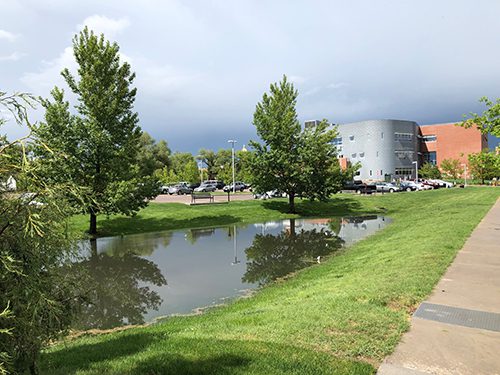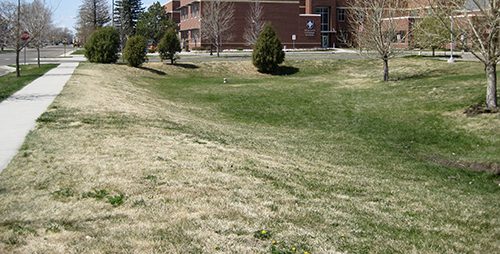 As a LEED® (Leadership in Energy and Environmental Design) certified building, Laramie County Library is dedicated to continually pursuing advancements that make us better stewards of the community and the environment. One of those pursuits is the transformation of the library’s detention pond.
As a LEED® (Leadership in Energy and Environmental Design) certified building, Laramie County Library is dedicated to continually pursuing advancements that make us better stewards of the community and the environment. One of those pursuits is the transformation of the library’s detention pond.
Nancy Loomis, the project leader for the Community Wildlife Habitat Project, West Edge District, will be writing a series of blog posts explaining the Laramie County Library Water-wise and Pollinator Bio-retention System Project and its impact on the local ecosystem. Check the library’s website for the latest blogs and updates on this impactful and exciting community effort.
 Very soon there will be a flurry of activity in the library’s detention pond, located in the southwest corner of the library’s property. The grassy concave bowl is designed to collect stormwater run-off from the parking lot. The basin temporarily holds stormwater until it can infiltrate into the soil. Excess water is captured by a perforated pipe located below the soil surface and then flows into the city’s stormwater drainage system. Currently, the infiltration basin is planted with a monoculture of mowed grasses and a few trees but that is about to change. Soon the area will be planted with more than 4500 individual plants from over 70 different regionally native plant species.
Very soon there will be a flurry of activity in the library’s detention pond, located in the southwest corner of the library’s property. The grassy concave bowl is designed to collect stormwater run-off from the parking lot. The basin temporarily holds stormwater until it can infiltrate into the soil. Excess water is captured by a perforated pipe located below the soil surface and then flows into the city’s stormwater drainage system. Currently, the infiltration basin is planted with a monoculture of mowed grasses and a few trees but that is about to change. Soon the area will be planted with more than 4500 individual plants from over 70 different regionally native plant species.
In February of 2017 a meeting was held between library personnel and representatives from the Laramie County Conservation District, Cheyenne Board of Public Utilities and the Community Wildlife Habitat Project, West Edge District to discuss a project that would diversify the plantings within the library’s detention pond. It was agreed upon by the Community Partners at this initial meeting to move forward with the project.
The following goals were established:
- diversify the plantings to help filtrate out pollutants from the stormwater run-off
- decrease the need for supplemental irrigation and decrease the workload of library personnel
- increase urban wildlife habitat while creating an attractive outdoor learning environment
- create a seed source for the library’s Seed Library
After multiple attempts to find a funding source for the project and an additional year devoted to creating a design, the planting of the Laramie County Library Water-wise and Pollinator Bio-retention System (Project) will begin in May.
This blog post provides a brief introduction to the project. Future posts in this series will provide readers with a better understanding of the project’s goals, as well as the specifics of the project itself, including design and plant selections.
Nancy Loomis
Project Leader: Community Wildlife Habitat Project, West Edge District
